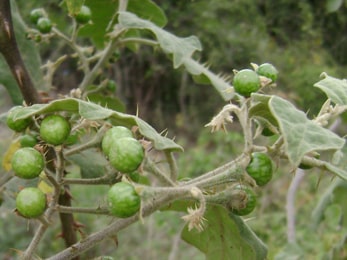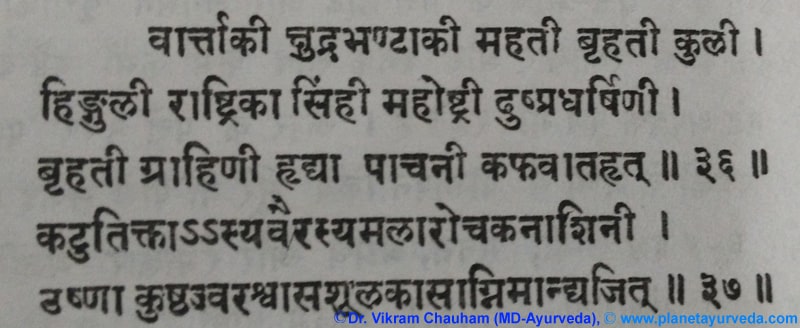Brihati, Poison Berry (Solanum indicum) – Practical Uses, Benefits and Dosage

Description of Plant
Brihati (Solanum indicum) is a spiny and highly branched shrub, usually dispersing or diffused, growing up to 1-5 meters in height. Its younger branches are thickly covered with minute star – shaped hair. The spines are shining yellow, about 1-5 cm long.
The leaves are large, simple and oval shaped with a length of about 10 cm and these are prickled in the middle vein. Their flowers are purple colored about 2 cm long. The fruits are round reddish or dark yellow colored when ripe, about 1.5 – 2 cm. The seeds are smooth, minutely pitted. Roots are long pale yellowish-brown in color. Brihati is woody, cylindrical, ribbed and well developed about 2.5 cm in diameter. It has numeral secondary roots having branches and its surface is rough due to presence of longitudinal striations and root scars, fracture, short and splintery and no distinct odor and taste.
General Description
According to Ayurvedic concept Brihati is one of the finest herbal remedy for certain conditions like cold, cough, sore throat and asthma. It is good herbal appetizer, digestive, diuretic and is beneficial to the heart.
Its fruit and root consists of wax, fatty acids and alkaloids solanine. It is also found that its fruits have Phosphorous in very rich quantity than the amount of calcium in it. Other chemical compounds found in this plant is Carotene, Carpesterol, Solanocarpone, Diosogenin, B- Sitosterol, Lanosterol, Solasonine, Solamargine, Solasodine, vitamin C etc solanidine.
Classification
- Kingdom: Plantae
- Family: Solanaceae
- Genus: Solanum
- Species: Indicum
Habitat
Brihati grows in tropical and sub- tropical areas of India and Nepal up to an elevation of 1500m. This herb occurs throughout India, usually in waste places, on roadsides and in open scrublands.
Names
- English Name – Poison Berry, Indian Nightshade, African Eggplant, Bush Tomato
- Hindi Name – Badi Kateri, Vanabhanta
- Punjabi Name – Kandiarivadd
- Telugu Name – Pedda Mulaka, Tella Mulaka
- Bengali Name – Rambegun, Vyakud
- Tamil Name – Anachundai, Papparamalli,
- Kannada Name – Kirugullia, Heggulla, Gulla
- Marathi Name – Dorali
- Assamese Name – Tilabhakuri
- Guajarati Name – Ubhi ringani
- Urdu Name – Kateli
- Farsi Name – Katai Kalaam
Ayurvedic Properties
| Hindi / Sanskrit | English | ||
| Rasa | Katu, Tikta | Taste | Pungent, Bitter |
| Guna | Laghu, Rooksha | Physical Property | Light, Dry |
| Virya | Ushna | Potency | Hot |
| Vipaka | Katu | Metabolic Property (After Digestion) | Pungent |
Effects on Doshas
It balances Kapha and Vata doshas.
Classical Categorization
| Charak Samhita | Sushruta Samhita | Vagbhata Samhita |
|
|
|
Ancient Verse about Solanum indicum

The Bhavprakash nighantu edition of 1998: verse – 36-37, page no. 288-289.
The name and properties of Badi Kateri are Vartaki, Shudrabhantaki, Mahati, Brihati, Kuli, Hinguli, Rashritika, Sinhi, Mahoshati and Duspradharshini are all its Sanskrit name. It helps to bind stools. Good for heart, digestion. It manages cough and Vata disease. The herb is bitter and pungent in taste. It corrects tastelessness of mouth, anorexia, skin disease, fever, asthma, cough and body aches. Due to its hot potency, it promotes digestive fire, and manages fever, asthma and pain.
References:-
The Bhavprakash nighantu with elaborated commentary by Padmashri prof. K.C. Chunekar, edited by Dr. G.S. Pandey: edition of 1998; verse – 36-37, page no. 288 – 289.
Practical Uses of Solanum indicum
- Solanum indicum is an antioxidant, anticancer, anti-inflammatory, diuretic, immunomodulatory, and has neuroprotective effects and is diaphoretic, expectorant and stimulant also.
- Ayurveda has considered it to be one of the finest herb useful in treating cold, cough, sore throat and asthma.
- Brihati is a benefit providing herb in conditions of digestive troubles and has effective results in appetite, indigestion, dysentery, gas and intestinal worms.
- This herb stimulates and strengthens the heart and is useful in cardiac disorders and improves the condition of edema.
- Being a diuretic it has beneficial actions in case of dysuria and urinary calculi.
- The seeds of this plant have property to boost uterine contraction which has made its use in dysmenorrhea, amenorrhea and in difficult labor and diseases related to post-delivery (post-partum) period.
- It is useful in case of asthma, chronic respiratory disorders.
- Brihati is also helpful in relieving abdominal colic pain.
- It has ability to relieve fever, vomiting and is a good ant-inflammatory agent.
- Effectively improves digestion strength.
- This herb holds an absorbent property and is a useful remedy in diarrhea, IBS and malabsorption syndrome.
- It has good uses in treating female infertility.
- Brihati provides carminative effects.
- A very good oral hygienic herbal agent that can remove tongue coating and relieves bad breath from mouth and its juice has pain relieving effects in case of toothache.
- Useful herb in managing the condition of anorexia.
- Good herbal remedy for skin diseases.
- Useful in Vata disorders (neurological).
- It can help in semen ejaculation problems and the paste of its seeds is applied over penis to improve erection.
- It acts as an efficient blood detoxifier.
- External application of its juice extract is used for treatment of alopecia.
- Its juice has been used for treatment of ringworm, gout and earache.
- Some other conditions in which application of this herb has good results are helminthes, hard urination, scorpion bites, recurrent fevers, chest pain, catarrah, and asthma.
Part Used
- Root
- Fruit
Dosage
- Powder – 2-3gm three times a day.
- Decoction – One ounce (30 ml) three times a day.
Caution
- No side effect has been noticed
- In case of pregnant mothers and children, it’s better to consult a doctor before the use of this herb.



